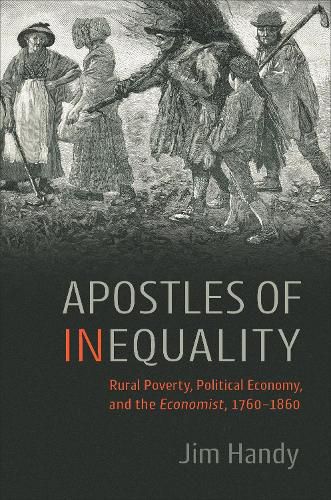Readings Newsletter
Become a Readings Member to make your shopping experience even easier.
Sign in or sign up for free!
You’re not far away from qualifying for FREE standard shipping within Australia
You’ve qualified for FREE standard shipping within Australia
The cart is loading…






Apostles of Inequality explores how changes to land use and ideas about political economy in late-eighteenth and early-nineteenth-century England drove cottagers from the land and impoverished rural workers.
Between 1760 and 1860, the English countryside was subject to constant attempts at agricultural improvement. Most often these meant depriving cottagers and rural workers of access to land they could cultivate, despite evidence that they were the most productive farmers in a country constantly short of food.
Drawing from a wide range of contemporary sources, Apostles of Inequality argues that such attempts, driven by a flawed faith in the wonders of capital, did little to increase agricultural productivity and instead led to a century of increasing impoverishment in rural England. Jim Handy rejects the assertions about the benefits that accompanied the transition to improved agriculture and details the abundant evidence for the efficiency of smallholder, peasant agriculture. He traces the development of both economic theory and government policy through the work of agricultural improver Arthur Young (1741-1820), government advisor Nassau William Senior (1790-1864), and the editors and writers of the Economist, as well as Adam Smith and Thomas Robert Malthus.
Apostles of Inequality demonstrates how a fascination with capital - promoted by political economy and farmers’ desires to have a labour force completely dependent on wage labour - fostered widespread destitution in rural England for over a century.
$9.00 standard shipping within Australia
FREE standard shipping within Australia for orders over $100.00
Express & International shipping calculated at checkout
Apostles of Inequality explores how changes to land use and ideas about political economy in late-eighteenth and early-nineteenth-century England drove cottagers from the land and impoverished rural workers.
Between 1760 and 1860, the English countryside was subject to constant attempts at agricultural improvement. Most often these meant depriving cottagers and rural workers of access to land they could cultivate, despite evidence that they were the most productive farmers in a country constantly short of food.
Drawing from a wide range of contemporary sources, Apostles of Inequality argues that such attempts, driven by a flawed faith in the wonders of capital, did little to increase agricultural productivity and instead led to a century of increasing impoverishment in rural England. Jim Handy rejects the assertions about the benefits that accompanied the transition to improved agriculture and details the abundant evidence for the efficiency of smallholder, peasant agriculture. He traces the development of both economic theory and government policy through the work of agricultural improver Arthur Young (1741-1820), government advisor Nassau William Senior (1790-1864), and the editors and writers of the Economist, as well as Adam Smith and Thomas Robert Malthus.
Apostles of Inequality demonstrates how a fascination with capital - promoted by political economy and farmers’ desires to have a labour force completely dependent on wage labour - fostered widespread destitution in rural England for over a century.